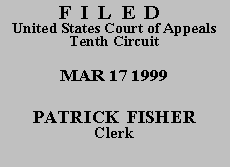

| UNITED STATES OF AMERICA,
Plaintiff-Appellee, v.
RICHARD RAY LACEY,
Defendant-Appellant.
|
|
Defendant Richard Lacey, a federal prisoner appearing pro se, appeals the district court's denial of his motion pursuant to Fed. R. Crim. P. 41(e) for return of property. We exercise jurisdiction pursuant to 28 U.S.C. § 1291 and affirm.(1)
Lacey was arrested on July 6, 1989, for suspicion of narcotics trafficking. At the time of his arrest, approximately $6,950 in currency was seized from his vehicle. An administrative forfeiture proceeding pursuant to 21 U.S.C. § 881(a)(6) was commenced and, on February 20, 1990, a declaration of forfeiture was issued as to the seized currency. Lacey was convicted of six drug-related offenses. See United States v. Lacey, 86 F.3d 956 (10th Cir. 1996) (affirming his convictions and sentence).
On March 13, 1998, approximately seventeen months after his convictions became final and nearly nine years after his arrest, Lacey filed a motion pursuant to Fed. R. Crim. P. 41(e) for return of the seized currency. Lacey contended he did not receive timely personal notice of the administrative forfeiture proceedings, and the seized currency was not connected to illegal activity. The district court treated the motion as a civil complaint and concluded it was barred by the applicable statute of limitations, 28 U.S.C. § 2401(a). As an alternative ground for denial, the court found Lacey did receive proper notice of the proceedings. Because we conclude the motion was time-barred, we need not reach the alternative holding.
Federal courts "have jurisdiction under 28 U.S.C. § 1331 to review whether [an] administrative forfeiture satisfied statutory and due process requirements." United States v. Rodgers, 108 F.3d 1247, 1250 (10th Cir. 1997). The court properly construed Lacey's motion as a civil complaint under 28 U.S.C. § 1331. See United States v. Clark, 84 F.3d 378, 381 (10th Cir. 1996). We review de novo the district court's determination that Lacey's complaint is barred by the statute of limitations. Sterlin v. Biomune Systems, 154 F.3d 1191, 1194 (10th Cir. 1998).
A complaint challenging procedural deficiencies in an administrative forfeiture proceeding is subject to the general six-year statute of limitations in 28 U.S.C. § 2401(a). Palanco v. United States Drug Enforcement Admin., 158 F.3d 647, 652 (2d Cir. 1998). "[E]very civil action commenced against the United States shall be barred unless the complaint is filed within six years after the right of action first accrues." 28 U.S.C. § 2401(a). Here, any cause of action Lacey might have had accrued no later than February 20, 1990, when the declaration of forfeiture was issued as to the seized currency. Because Lacey's complaint was not filed until March 13, 1998, it was barred by the statute of limitations.(2)
AFFIRMED. The mandate shall issue forthwith.
Entered by the Court
Mary Beck Briscoe
Circuit Judge
*. This order and judgment is not binding precedent, except under the doctrines of law of the case, res judicata, and collateral estoppel. The court generally disfavors the citation of orders and judgments; nevertheless, an order and judgment may be cited under the terms and conditions of 10th Cir. R. 36.3.
1. Lacey has filed a motion for leave to proceed in forma pauperis on appeal. Because he was granted leave to proceed in forma pauperis in district court, and because the district court did not certify his appeal was not taken in good faith, Fed. R. App. P. 24(a) (now codified as 24(a)(3)) allows him to proceed in forma pauperis on appeal without further authorization. We note, however, that does not absolve him of the responsibility of paying the full amount of the filing fee. See 28 U.S.C. § 1915(b)(1).
2. The record on appeal clearly indicates Lacey and his criminal defense attorney received notice of the administrative forfeiture proceedings no later than December 13, 1989, and were thus aware of the subsequent declaration of forfeiture.